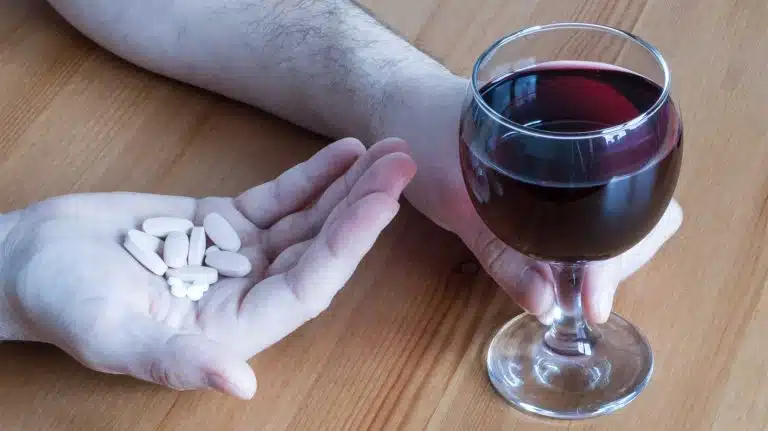Mixing Vicodin & Alcohol | Effects & Health Risks
- Effects Of Mixing Vicodin & Alcohol
- Risks Of Mixing Alcohol With Vicodin
- Treatment For Alcohol & Vicodin Abuse

Mixing Vicodin and alcohol can lead to severe drowsiness, reduced heart rate, respiratory depression, and long-term substance abuse.
Vicodin is a popular prescription painkiller. Data from 2017 reports that millions of hydrocodone and acetaminophen prescription drugs were sold to patients, which includes Vicodin. Millions of Americans drink alcohol every year.
The risks of mixing Vicodin and alcohol may be significant for many people since both are common substances in the United States.
Effects Of Mixing Vicodin & Alcohol
The two active ingredients of Vicodin are hydrocodone and acetaminophen. Hydrocodone is an opioid, while acetaminophen is a mild pain reliever. Both can combine with alcohol to create side effects.
Alcohol and hydrocodone both affect the central nervous system. Some people may mix these products to get a more intense “high.” Immediate effects of Vicodin and alcohol together include:
- drowsiness
- changes in mood
- pain relief
- numbness
- sedation
- impairment
The risks of mixing alcohol with acetaminophen may not be as immediate, but a combination product like Vicodin can have both of its active ingredients interact with alcohol.
Risks Of Mixing Alcohol With Vicodin
Official labels for Vicodin warn against mixing it with alcohol, due to the high risk of central nervous system depression. Mixing alcohol and Vicodin also comes with other risks.
Severe CNS Depression
Hydrocodone and alcohol are both depressants that slow down activity in the central nervous system, or CNS. When taken together, they can cause more severe depression than if they were taken separately.
This mixing is known as an additive effect and can cause previously safe doses to become overdoses.
Severe CNS depression can be dangerous in some cases, as your body may have a harder time doing basic functions. A signature sign of severe CNS depression is respiratory depression, where your breathing can slow down or even stop entirely.
Other risks of CNS depression include sedation, impairment, coma, and low blood pressure. One study showed about 15% of opioid overdose deaths also involved alcohol in 2017. Since Vicodin is a common prescription opioid, many of these deaths likely involved Vicodin.
Liver Damage
High doses of acetaminophen can cause acute liver failure. Heavy alcohol use can also cause liver damage.
Mixing alcohol and acetaminophen products (including Vicodin and over-the-counter products like Tylenol) is generally not recommended by health experts because they both affect the liver.
However, some studies suggest alcohol does not increase the risk of acute liver failure in patients taking acetaminophen in recommended doses. Others show that alcohol can actually reduce the severity of liver failure caused by acetaminophen overdoses.
These studies still stress the importance of moderate drinking and directed dosings, and warn against overdosing on both. How drinking alcohol affects the absorption of acetaminophen may depend on when they were taken and the amounts taken.
Drug & Alcohol Abuse
Taking Vicodin without following prescription guidelines is a form of drug abuse. Combining drugs and alcohol to get a more intense “high” is also a form of drug and alcohol abuse.
In 2018, over 5.5 million U.S. teenagers and adults abused hydrocodone products. One year later in 2019, over 14.5 million U.S. adults had a long-term alcohol use disorder (AUD).
Drug and alcohol abuse can become long-term mental health problems known as substance use disorders and AUDs. At this stage of misuse, it can be hard to quit even if your health is declining.
Treatment Options For Alcohol & Vicodin Abuse
Prescription opioid abuse has generally declined in recent years, but still affects millions per year in the United States. Alcohol addiction and abuse continue to be major health problems and have been for many years.
Treating alcohol and drug addiction at the same time can be difficult on your own. You may need help from a professional treatment center, where you can detox from both drugs and alcohol while being monitored.
You may then be put on a treatment program, which may include an inpatient stay, outpatient counseling, and learning lifestyle habits. To find a treatment center that caters to your needs, please contact our helpline today.
Written by Ark Behavioral Health Editorial Team
©2024 Ark National Holdings, LLC. | All Rights Reserved.
This page does not provide medical advice.
Drug Enforcement Administration (DEA) - Hydrocodone
Food and Drug Administration (FDA) - Vicodin
Journal of the American Medical Association - Alcohol or Benzodiazepine Co-involvement With Opioid Overdose Deaths in the United States, 1999-2017
National Institute on Alcohol Abuse and Alcoholism - Alcohol Facts and Statistics
National Institute on Drug Abuse - Prescription Opioids DrugFacts
Questions About Treatment?
Ark Behavioral Health offers 100% confidential substance abuse assessment and treatment placement tailored to your individual needs. Achieve long-term recovery.
100% confidential. We respect your privacy.
Prefer Texting?
Our friendly support team is here to chat 24/7. Opt out any time.







 Learn More
Learn More








